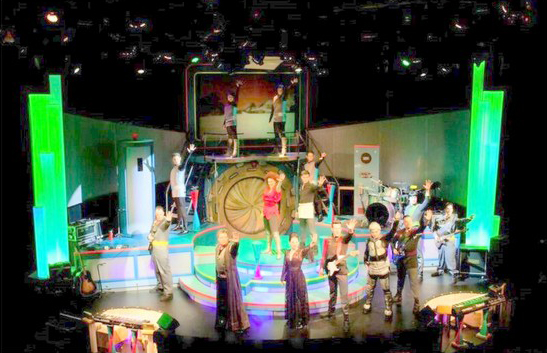Elite Branches Out with Family Trees
by Shirley Lorraine
2731 S. Victoria Ave
In the World Premiere of Family Trees, family members come together to solve a problem and secrets are revealed following the death of Mike (Evan Austin) and Tina’s (Genevieve Levin) mother. A curmudgeonly busybody neighbor (Dorrie Braun) and her milquetoast son (Sabastien Montgomerie) fill in gaps in the offspring’s knowledge and memories. The play is a frank study in the elasticity of relationship dynamics, filled with humor, laced with universal truths and a few surprises.
Playwright Jason Furlani was on hand opening weekend to share in the joy and the nerves that mounting a new work can bring. Family Trees, playing on the Elite’s South stage, is a good match for the theater’s continuing mix of thought-provoking productions. Based in part on Furlani’s own experiences, the play touches on many common situations that arise after a death, as well as a few unusual viewpoints for consideration.
While the actors are new to the Elite stage, all four of them bring a wealth of theatrical experience to the boards. The opinionated characters are well developed, embodying personality elements familiar to many. Director William Carmichael pulls solid performances out of each actor. No doubt as the run continues, the cast will continue to ease naturally into their roles as siblings and friends, evening out the fluctuations in their contrasts.
The setting is a typical family home in Schenectady, New York. Well adorned with ceramic plates on the walls and the usual kitchen accoutrements, the set oozes a cozy, homey feel that instantly gives the audience a comfortable place in which to digest.the quirky material. It is easy to sit back, relax and enjoy the show and at the same time, be able to ponder questions raised by the introduction of deeper ideas. Mother’s urn rests casually on the dining room table while preparations are made to add her to the grove of trees nurtured by relatives past providing the ultimate in recycling efforts.
Dorrie Braun appears to be having a great deal of fun as the neighbor whose bun is too tightly wound. Her straight-edged demeanor provides a sharp contrast to that of Montgomerie’s possibly challenged, yet highly enthusiastic portrayal of a man-child who explores the boundaries of independence while building new relationships. His dialogue was a curious mix of intelligent thought and unsophisticated phrasing which I found a bit jarring.
Austin and Levin’s performances both have the volume turned down in the beginning but amp it up as the action progresses. Placing the liquor on the bottom shelf seemed a bit awkward. Frequent trips to the cabinet would be more logical at counter height.
Family Trees has yet to be published and still has opportunity for refinement.
Family Trees runs through Dec 18. Friday & Saturday eves 8 PM, Sunday matinees 2 p.m.
All seats $15. Reservations encouraged. 483-5118
Elite Theatre Company
2731 Victoria Avenue
Oxnard, CA 93035
www.elitetheatre.org
